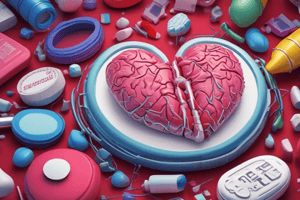Podcast
Questions and Answers
What can occur as a serious effect of acute withdrawal from beta blockers?
What can occur as a serious effect of acute withdrawal from beta blockers?
- Reduced risk of myocardial infarction
- Enhanced muscle contraction
- Improved blood sugar levels
- Increased blood pressure (correct)
Which of the following calcium channel blockers is categorized as a dihydropyridine?
Which of the following calcium channel blockers is categorized as a dihydropyridine?
- Verapamil
- Nicardipine
- Amlodipine (correct)
- Diltiazem
What is the primary mechanism of action for calcium channel blockers?
What is the primary mechanism of action for calcium channel blockers?
- Increasing calcium influx into cells
- Stimulating adrenaline release
- Enhancing muscle contraction in the heart
- Preventing calcium entry into heart and vascular smooth muscle cells (correct)
Which condition is most commonly associated with the use of calcium channel blockers?
Which condition is most commonly associated with the use of calcium channel blockers?
Which beta blocker has a secondary effect of delaying recovery from hypoglycemia in type 1 diabetes patients?
Which beta blocker has a secondary effect of delaying recovery from hypoglycemia in type 1 diabetes patients?
What is the primary effect of Angiotensin II Receptor Blockers (ARBs) on the vascular system?
What is the primary effect of Angiotensin II Receptor Blockers (ARBs) on the vascular system?
For which condition are ARBs NOT typically indicated?
For which condition are ARBs NOT typically indicated?
Which of the following adverse effects is less likely to occur with ARBs compared to ACE inhibitors?
Which of the following adverse effects is less likely to occur with ARBs compared to ACE inhibitors?
What is a known contraindication for the use of ARBs?
What is a known contraindication for the use of ARBs?
Which of the following statements is true regarding the mechanism of action of eplerenone?
Which of the following statements is true regarding the mechanism of action of eplerenone?
What beneficial hemodynamic effect is associated with ARBs?
What beneficial hemodynamic effect is associated with ARBs?
Which of the following ARBs is listed as an example?
Which of the following ARBs is listed as an example?
What is the main therapeutic effect of ARBs?
What is the main therapeutic effect of ARBs?
What is the primary indication for the use of nimodipine?
What is the primary indication for the use of nimodipine?
Which condition is NOT a contraindication for nimodipine usage?
Which condition is NOT a contraindication for nimodipine usage?
Which of the following is an adverse effect commonly associated with nimodipine?
Which of the following is an adverse effect commonly associated with nimodipine?
Which of the following drugs is classified as a centrally acting adrenergic?
Which of the following drugs is classified as a centrally acting adrenergic?
What effect do centrally acting adrenergic drugs have on the sympathetic nervous system (SNS)?
What effect do centrally acting adrenergic drugs have on the sympathetic nervous system (SNS)?
Which subcategory of adrenergic drugs involves the stimulation of alpha2-adrenergic receptors?
Which subcategory of adrenergic drugs involves the stimulation of alpha2-adrenergic receptors?
Which of the following actions is NOT attributed to the stimulation of the sympathetic nervous system (SNS)?
Which of the following actions is NOT attributed to the stimulation of the sympathetic nervous system (SNS)?
Which of the following drugs is likely NOT included on the quiz regarding dihydropyridine CCBs?
Which of the following drugs is likely NOT included on the quiz regarding dihydropyridine CCBs?
What primarily causes chronic stable angina?
What primarily causes chronic stable angina?
Which of the following best describes myocardial infarction?
Which of the following best describes myocardial infarction?
What is the main therapeutic objective of antianginal drug therapy?
What is the main therapeutic objective of antianginal drug therapy?
Which class of drugs is NOT typically used in the treatment of angina?
Which class of drugs is NOT typically used in the treatment of angina?
What condition is defined as damaged tissue resulting from inadequate oxygen supply?
What condition is defined as damaged tissue resulting from inadequate oxygen supply?
In the context of angina, what triggers reflex tachycardia?
In the context of angina, what triggers reflex tachycardia?
Which of these types of angina is caused by spasms of the coronary arteries?
Which of these types of angina is caused by spasms of the coronary arteries?
What could be considered a worst-case outcome of untreated coronary artery disease?
What could be considered a worst-case outcome of untreated coronary artery disease?
What is considered a normal therapeutic level for digoxin?
What is considered a normal therapeutic level for digoxin?
Which condition does NOT generally require monitoring of digoxin levels?
Which condition does NOT generally require monitoring of digoxin levels?
What is a common sign of digoxin toxicity?
What is a common sign of digoxin toxicity?
When is digoxin immune Fab indicated?
When is digoxin immune Fab indicated?
Which condition does NOT predispose a patient to digoxin toxicity?
Which condition does NOT predispose a patient to digoxin toxicity?
What should be monitored due to potentially increasing digoxin toxicity?
What should be monitored due to potentially increasing digoxin toxicity?
After administration of digoxin immune Fab, how will serum digoxin levels appear?
After administration of digoxin immune Fab, how will serum digoxin levels appear?
What is a contraindication to using digoxin immune Fab?
What is a contraindication to using digoxin immune Fab?
Flashcards are hidden until you start studying
Study Notes
Beta Blockers
- Beta blockers work by blocking the effects of epinephrine and norepinephrine on the heart and blood vessels.
- Beta blockers can be caused by acute withdrawal of the drug.
- Beta blockers can be used in conjunction with other antihypertensive agents.
- Beta blockers can exacerbate underlying angina, precipitate an MI, or cause rebound hypertension.
- Beta blockers delay the recovery from hypoglycemia in patients with type 1 diabetes.
- Beta blockers are rarely used in those with type 2 diabetes.
- Probably on Quiz (POQ): atenolol, carvedilol, metoprolol, propranolol
- Probably not on Quiz (PNOQ): esmolol, Labetalol,, sotalol, phentolamine, tamsulosin
Calcium Channel Blockers (CCB)
- Calcium plays a key role in heart and vascular smooth muscle contraction.
- CCBs work by blocking calcium channels, preventing calcium from entering the cells of the heart and arteries.
- CCBs cause blood vessels to relax and open.
- There are three chemical classes of CCBs:
- Phenylalkylamines (e.g., verapamil)
- Benzothiazepines (e.g., diltiazem)
- Dihydropyridines (e.g. amlodipine)
- Probably on Quiz (POQ): diltiazem, amlodipine, felodipine nifedipine, nimodipine, verapamil
- Probably not on Quiz (PNOQ): isradipine nicardipine
Centrally Acting Adrenergics
- Stimulation of the SNS leads to an increase in heart rate, force of contraction, blood vessel constriction, and renin release from the kidney, resulting in hypertension.
- Centrally acting adrenergic drugs like clonidine and methyldopa work by stimulating alpha2-adrenergic receptors in the brain.
- These drugs can be described as having central action (in the brain) or peripheral action (at the heart and blood vessels)
Angiotensin II Receptor Blockers (ARB)
- ARBs block the binding of AII to type 1 AII receptors.
- ARBs affect primarily vascular smooth muscle and the adrenal gland.
- ARBs block vasoconstriction and aldosterone secretion.
- ARBs are used in the treatment of hypertension or heart failure, alone or in combination with other drugs like diuretics.
- ARBs decrease SVR, a measure of afterload.
- Probably on Quiz (POQ): losartan (Cozaar) ,valsartan (Diovan), irbesartan (Avapro)
- Probably not on Quiz (PNOQ): candesartan (Atacand), eprosartan (Teveten), telmisartan (Micardis), olmesartan (Benicar)
Miscellaneous Antihypertensive Drugs
- Eplerenone (Inspra) is used for hypertension.
- Eplerenone is a selective aldosterone blocker.
- Eplerenone is indicated for the treatment of hypertension and post-MI heart failure.
Types of Antianginal Drugs
- Three main classes of drugs treat angina:
- Nitrates
- Beta-blockers
- Calcium channel blockers (CCBs)
Objectives of Antianginal Drug Therapy
- Minimize the frequency of attacks and decrease the duration and intensity of the anginal pain.
- Improve the patient’s functional capacity with as few adverse effects as possible.
- Prevent or delay the worst possible outcome, MI.
Digoxin
- Digoxin is a cardiac glycoside used to treat heart failure and atrial fibrillation.
- Therapeutic digoxin levels are 0.5 to 2 ng/mL.
- Low potassium or magnesium levels may increase the potential for digoxin toxicity.
- Digoxin is excreted almost exclusively by the kidneys.
- Signs and symptoms of digoxin toxicity include bradycardia, headache, dizziness, confusion, nausea, and visual disturbances.
- ECG findings may include heart block, atrial tachycardia with block, or ventricular dysrhythmias.
Digoxin Immune Fab (Digifab)
- Digoxin immune Fab is the antidote for severe digoxin overdose.
- Digoxin immune Fab is indicated for the reversal of life-threatening cardiotoxic effects.
- Digoxin immune Fab is contraindicated in patients with hypersensitivity to it.
- It is available only in parenteral form and dosed based on the patient’s serum digoxin level and weight.
- After Digoxin immune Fab is given, all subsequent serum digoxin level measurements will be elevated for days to weeks.
Studying That Suits You
Use AI to generate personalized quizzes and flashcards to suit your learning preferences.




